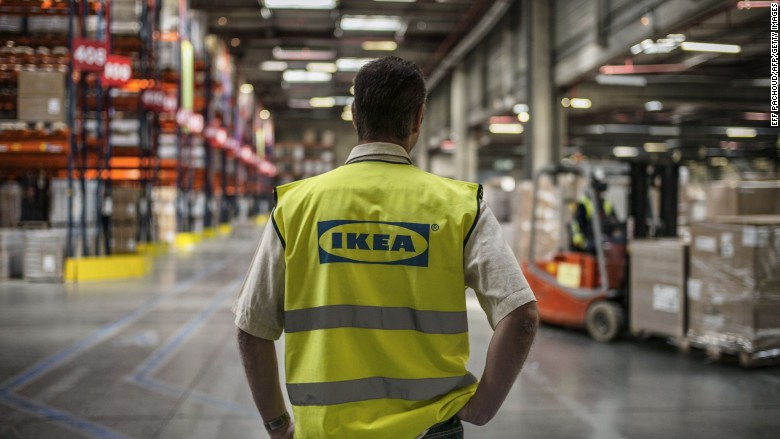
Ikea will boost its minimum wage to $10 per hour next year, the company said Wednesday.
The company's new $10 minimum will be a 15% hike from existing pay, while some workers will make more than $14 an hour.
Ikea's wages vary from store to store depending on the local cost of living, thanks to a new plan it implemented in January. That's when the store started to tie its pay to the MIT Living Wage Calculator -- which uses food prices, taxes, housing and transportation costs to calculate a "living wage" for metropolitan areas. The move gave 15,000 U.S. Ikea employees a raise at the start of this year.
As a result, employees in Pittsburgh and St. Louis currently make a minimum of $8.69 per hour, while workers in Woodbridge, Virginia are paid at least $13.22.
The company says its new policy has reaped significant benefits.
Related: Walmart's profits hurt by wage hike for employees
"Employee turnover rates are down" five percent since the new policy went into effect, CFO Rob Olson told CNNMoney. He added that the company is also getting a "stronger pool of applicants" for new positions since the switch.
"This is not only the right thing to do for our co-workers, it's also good for business," Ikea's U.S. president, Lars Petersson, said in a statement.
But basing pay on a "living wage" can be complicated, Olson pointed out. An area's cost of living can decrease, something that actually happened this year in Sunrise, Florida. Employees there won't have to take a pay cut -- instead that store's minimum wage will stay at $11.72 for 2016.
Ikea's initial minimum pay hike came after several other major U.S. employers -- including Wal-Mart (WMT), McDonald's (MCD) and T.J. Maxx (TJX) -- made similar announcements last year. But Ikea was the first to tie its new rates to the local cost of living, and that's an idea that came from within the company, Olson said.
"We started looking at it a couple of years ago," he said. "Our wages were above average compared to our competition, but we realized that wasn't as important anymore. It was about making sure workers could cover local living costs."

